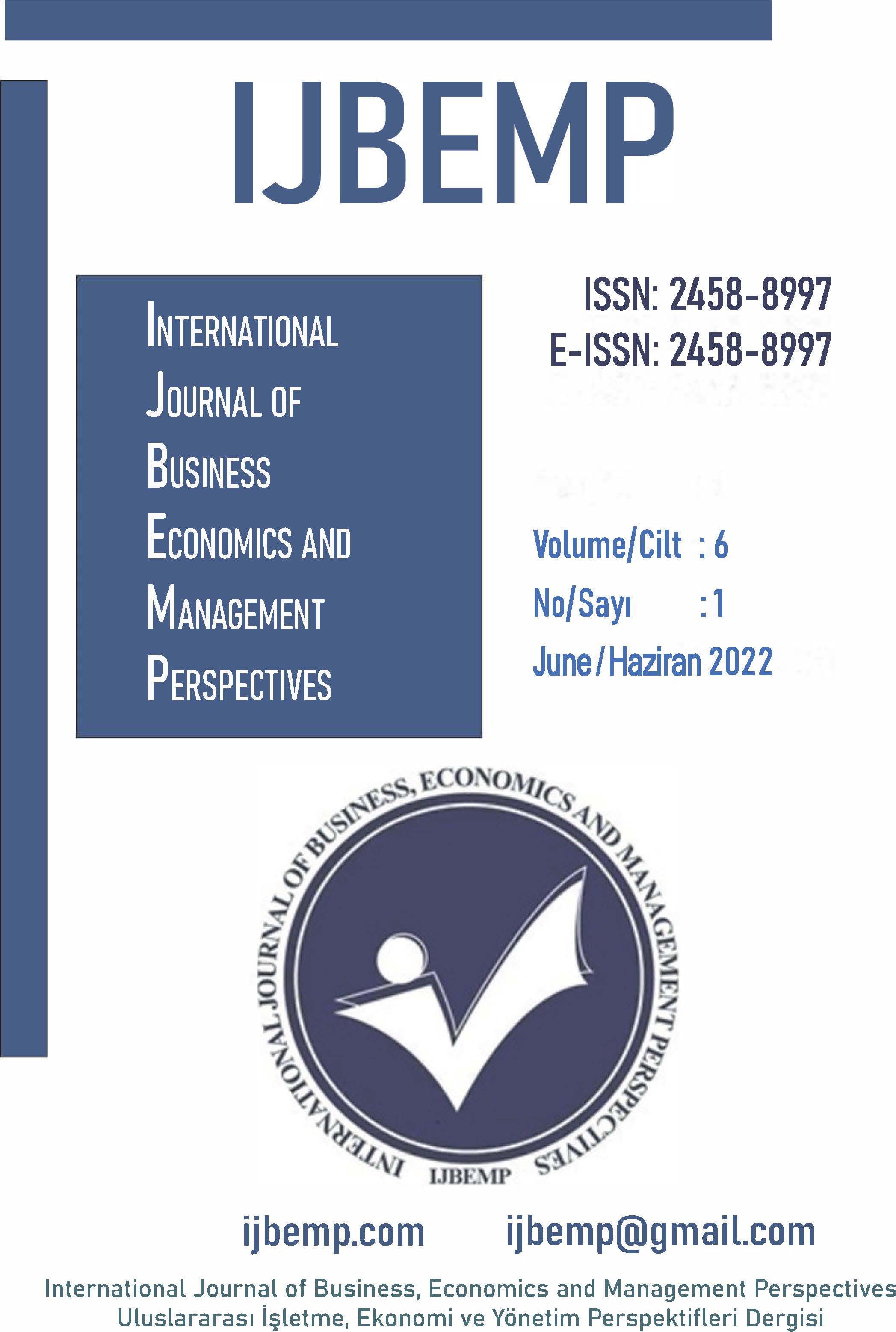TFRS 15 - MÜŞTERİ SÖZLEŞMELERİNDEN HASILAT STANDARDININ FİNANSAL RAPORLAMAYA ETKİSİ: BİST 100 ÜZERİNE BİR ARAŞTIRMA
Author :
Abstract
Finansal raporlama kalitesini artırmak ve uluslararası muhasebe uygulamalarında standardı yakalamak için finansal raporlama standartları geliştirilmiştir. İşletmelerin temel performans göstergelerinden olan hasılat standardı ile ilgili olarak çok sayıda standardın varlığından kaynaklı karmaşıklığı ortadan kaldırmak ve hasılat işlemlerinde tekdüze uygulamaları geliştirmek amacıyla TFRS 15 Müşteri Sözleşmelerinden Hasılat Standardı geliştirilmiştir. Araştırmanın amacı; TFRS 15 standardının uygulanması ile birlikte, uygulamadan etkilenen sektörlerin ve uygulamanın finansal raporlama üzerindeki etkilerinin araştırılmasıdır. Araştırma kapsamında BİST 100 şirketlerinin finansal raporları incelenerek TFRS 15 standardının etkilerini açıklayan şirketler tespit edilmiştir. Finansal raporlar üzerinde yapılan içerik analizinde, TFRS 15 standardının uygulamasından ulaştırma, haberleşme, teknoloji, enerji, imalat, mali kuruluşlar ve perakende sektörlerini farklı düzeylerde etkilendiği tespit edilmiştir. TFRS 15 standardı uygulamasının Cari Oran, Aktif Devir Hızı, Aktif Karlılık Oranı ve Özkaynak Karlılık Oranı üzerinde istatiksel açıdan anlamlı farklılık olmadığı tespit edilmiştir. Özkaynak karlılık oranında ise, % 10 güven aralığında ise istatiksel açıdan anlamlı farklılık olduğu tespit edilmiştir.
Keywords
Abstract
Financial reporting standards have been developed to increase the quality of financial reporting and to achieve the standard in international accounting practices. IFRS 15 Revenue from Customer Contracts Standard has been developed in order to eliminate the complexity caused by the existence of many standards regarding the revenue standard, which is one of the main performance indicators of the enterprises, and to develop uniform practices in revenue transactions. Purpose of the research; With the implementation of the IFRS 15 standard, it is the investigation of the sectors affected by the application and the effects of the application on financial reporting. Within the scope of the research, the financial reports of BIST 100 companies were examined and the companies that explained the effects of the IFRS 15 standard were determined. In the content analysis on the financial reports, it has been determined that the implementation of the IFRS 15 standard affects the transportation, communication, technology, energy, manufacturing, financial institutions and retail sectors at different levels. It has been determined that there is no statistically significant difference in the application of IFRS 15 standard on Current Ratio, Asset Turnover Rate, Asset Profitability Ratio and Equity Profitability Ratio. It has been determined that there is a statistically significant difference in the return on equity ratio in the 10% confidence interval.
Keywords
- Aktaş, R., & Varol, İ. D. (2017). Yeni Hasılat Standardı UFRS 15’e Göre Hasılatın Muhasebeleştirilmesi: Çok Unsurlu Sözleşmeler Ve Sözleşme Değişiklikleri. Muhasebe ve Finansman Dergisi, 73, 27-50. http://journal.mufad.org.tr/attachments/article/883/2.pdf
- Ataman, B., & Cavlak, H. (2018). UFRS 15 Müşteri Sözleşmelerinden Hasılat: Temel İlkelerin İncelenmesi ve Bir Uygulama. M U İktisadi ve İdari Bilimler Dergisi, 403-430. https://doi.org/10.14780/muiibd.384075
- BDS 701. (2017). Bağımsız Denetim Standardı 701: Kilit Denetim Konularının Bağımsız Denetçinin Raporunda Bildirilmesi. Kamu Gözetimi Kurumu (KGK).
- BİST Pay Endeksleri Temel Kuralları. (2016). http://www.borsaistanbul.com/docs/default- source/endeksler/bist-pay-endeksleri-temel-kurallari.pdf?sfvrsn=4
- Calayoğlu, İ., & Yılmaz, R. (2016). TFRS-15’e Göre Yazılım Sektöründeki Sözleşmelerin Hasılatının Hesaplanması ve Tanınması. PESA Uluslararası Sosyal Araştırmalar Dergisi, 2(2), 18-42.
- Canada CPA. (2015). IFRS 15 Revenue from Contracts with Customers Your Questions Answered. Chartered Professional Accountants of Canada. https://www.cpacanada.ca/~/media/site/business-and-accounting-resources/docs/ifrs-15revenue-from-contracts-with-customers-your-questions-answered-july-2015.pdf
- Deloitte. (2015). Implementing IFRS 15 Revenue from Contracts with Customers A practical guide to implementation issues for the travel, hospitality and leisure sector. Deloitte.
- Deloitte. (2018). Revenue from Contracts with Customers A guide to IFRS 15. Deloitte. https://www.iasplus.com/en/publications/global/guides/a-guide-to-ifrs-15/file
- Durmuş, B., Yurtkoru, E. S., & Çinko, M. (2016). Sosyal Bilimlerde SPSS’le Veri Analizi (C. 1-6). Beta.
- Dyson, R. A. (2015). Case studies in the new revenue recognition guidance. The CPA Journal, 85(3), 22.
- Jones, J. P., & Pagach, D. (2013). The Next Step for Revenue Recognition: Examining the New Principles-Based Five-Step Model. The CPA Journal, 83(10), 30-34. http://link.galegroup.com/apps/doc/A348330954/AONE?sid=googlescholar
- KAP. (t.y.). KAP Sektörler. Geliş tarihi 27 Aralık 2018, gönderen https://www.kap.org.tr/tr/Sektorler
- KÇ. (2005). Finansal Raporlamaya İlişkin Kavramsal Çerçeve. Kamu Gözetimi Kurumu.
- Keskin, A. İ., & Dinçer, B. (2017). UFRS 15—Müşteri Sözleşmelerinden Elde Edilen Hasılat Standardının İncelenmesi ve Telekomünikasyon Sektörüne İlişkin Bir Uygulama. Maliye Finans Yazıları, 1(103), 219-246. http://dergipark.gov.tr/mfy/307964
- Köse, T., & Şengül Çelikay, D. (2015). Yeni Hasılat Standardı ve Getirdiği Değişiklikler. Mali Cozum Dergisi/Financial Analysis, 25(127), 19-44.
- KPMG. (2014). Issues In-Depth: Revenue from Contracts with Customers (s. 204). KPMG International Standards Group. http://www.execed.kpmg.com/content/PDF/Revenue-fromContracts-with-Customers.pdf
- KPMG. (2016). First Impressions: Revenue From Contracts with Customers. KPMG International Standarts Group. https://www.in.kpmg.com/ifrs/files/first-impressions-revenue-IFRS15.pdf
- Munter, P. (2016). The New Revenue Recognition Standard: Implications for Healthcare Companies. Management Accounting Quarterly, 17(2), 30-39.
- Özerhan, Y., Marşap, B., & Yanık, S. S. (2015). IFRS 15 Müşterilerle Yapılan Sözleşmelerden Doğan Hasılat Standardının İrdelenmesı̇. Muhasebe Bilim Dünyası, 17(2), 193-226. http://search.ebscohost.com/login.aspx?direct=true&db=a9h&AN=108659061&lang=tr&site= eds-live&authtype=ip,uid
- Silvia, M. (2015, Şubat 16). IFRS 15 Examples: How IFRS 15 Affects Your Company. IFRSbox. http://www.ifrsbox.com/ifrs-15-examples/
- Şavlı, T. (2016). UFRS 15 Kapsamında Açıklama ve Örneklerle Hasılatın Raporlanması. İSMMMO Yayınları; 164.
- Tabachnick, B. G., & Fidell, L. S. (2007). Using Multivariate Statistics (5. bs). Pearson/Allyn & Bacon.
- TFRS 15. (2016). Müşteri Sözleşmelerinden Hasılat. Kamu Gözetimi Kurumu.
- TFRS Yorum 13. (2008). Müşteri Sadakat Programları. Kamu Gözetimi Kurumu.
- TFRS Yorum 15. (2009). Gayrimenkul İnşaat Anlaşmaları. Kamu Gözetimi Kurumu.
- TFRS Yorum 18. (2009). Müşterilerden Varlık Transferleri. Kamu Gözetimi Kurumu.
- TMS 11. (2005). İnşaat Sözleşmeleri. Kamu Gözetimi Kurumu.
- TMS 18. (2005). Hasılat. Kamu Gözetimi Kurumu.
- TMS Yorum 31. (2007). Hasılat – Reklam Hizmetleri İçeren Takas (Barter) İşlemleri. Kamu Gözetimi Kurumu.
- Tutino, M., Regoliosi, C., Mattei, G., Paoloni, M., & Pompili, M. (2019). Does the IFRS 15 impact earnings management? Initial evidence from Italian listed companies. African Journal of Business Management, 13(7), 226-238.





